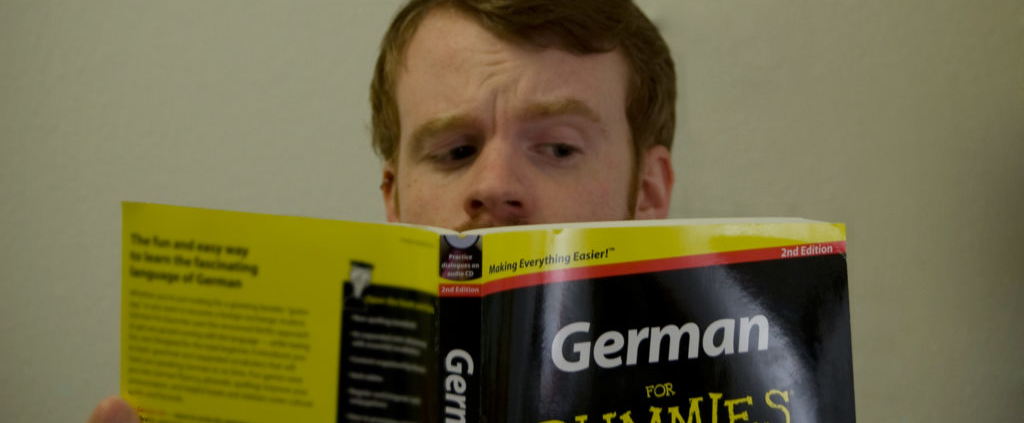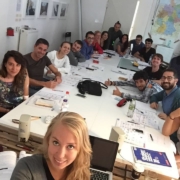10 unequivocal signs that German, for you, will always remain a mystery
Deutsche Sprache schwere Sprache, goes the saying. You might have known it prior to embarking on learning the language. But you love challenges, and you didn’t get discouraged: “How hard can it be? Six months, maximum one year of hard work and German will have no more secrets for me”. You enrolled in countless courses, you’ve climbed across levels, bought books and newspapers, listened with devotion the Deutsche Welle, harrased all sort of Tandempartners and passersby just to get a chance to practice your pronunciation.
But to your great astonishment, a few years have passed since you moved to Germany and you still struggle with a German that, although acceptable, can’t be defined as fluent and impeccable. You then start to feel a bit silly, asking yourself whether in your brain there is a specific zone whose task is to annul your efforts and delete all those notions that you constantly try to repeat by heart. But don’t worry, you’re not alone. We have identified 10 unequivocal signs that prove that German will remain to many a half mystery to many of us. In the name of reason we could say that no one has ever died out of not being a perfect mother tongue; likewise it can’t be used as an excuse: constancy, method and good teachers make more than satisfactory results even to the most refractory of minds to this impatient idiom.
Der, die or das?
It is one of the first things that you learn in school and, after all, learning the declination is not that hard. The real tough part is learning how to use the masculine, feminine and neutral: it’s true, there are some rules that allow us to understand the gender of a noun, but there are also several exceptions. Moreover, have you seen how many terms German has? Confronted with these challenges there are only 3 possible solutions: a) Renounce completely the article (several Berlin immigrants have opted for this option and have lived happily for decades), b) try to guess, c) mumble and try to trick your interlocutor. Neither option is one to be proud of…

Photo © Youtube
To decline correctly the adjective: maybe in another life?
The adjective, in German, is declined concurring to the gender, number and case. As if it wasn’t enough, there are three different forms of declinations according to the term that precedes it (determinative or indeterminative article or absence of the term). Such a combination requires for an indepth memory study. But the real challenge is when it comes to talking: you have to be able to coordinate article, adjective and noun, and prior to that, determine the gender of the noun, the operation upon which the whole mission depends on. The whole as trying to structure the whole architecture of the sentence. Headache? Kein Problem, the three suggested solutions before remain valid…

Photo © Deutschlernerblog.de
The verb at the end of the subordinates.
In German the infinite and the past participle go to the end in the main sentences, while in the subordinates there is also the verb to the indefinite form. The situation is even more appealing when, in Nebensatz, there is a modal verb and an infinite or, worse, a modal verb with the consequent, infamous rule of double infinity. Here too, with a lot of application, you can study the rule and apply it correctly when writing (quickly: let’s say in a fifteen to twenty minutes). Okay, but when are you in the middle of a speech? You let your beloved, old syntactic English structure take control and think “Who cares, I’ll sound weird but they’ll understand me the same”.
 Photo © slideshare.net
Photo © slideshare.net
The preposition lottery.
Place, time, cause, medium, purpose, adversity: German prepositions are infinite, can hold one or more cases and can express a myriad of different nuances. And, as if it weren’t enough, present countless exceptions. You know auf? Literally, it would mean “up”, when there is no contact with the underlyining surface (otherwise you would use über, clearly). An, on the other hand indicates proximity: “Sara ist an Fenster”, Sarah is at the window. Then again, to say “I’m at the postoffice”, why is it “ich bin auf der Post”? It is better not to question further.

Photo © memegen
Movies and songs in German.
At school they told you that looking at movies and series, alongside listening to songs is a great exercise. If possible, it would be even better without subtitles, this way you can train your ear. All true. However, most of the times, in class they propose you classics of German rock and pop, from Rammstein to the Ärzte (which are indeed more approachable also for students at an intermediate level), all the way to Bushido, one of Germany’s most notorious rappers. Heavy metal, punk, rap: but a good song-writer that pronounces everything clearly without screaming, without dialects and without guitars covering everything, is just not thinkable? We admit it with no problem: during these hearings we all cheated with subtitles every time we could.

rapper Bushido © YouTube
Wie bitte?
Staying on the topic of oral understanding: you exercise as much as you can with radio, CDs from your manual, TV series, newscasts. But when on the bus they ask you simply to pass through, or in a cafè they ask you if you want another lemon and ginger juice, you panic and you always find yourself asking your interlocutor: “Wie bitte?” asking to repeat the sentence not one, not twice, but as much as three times in a row. If you haven’t formed a wax cap, the only plausible explanation is that your auditory device is not calibrated to tune in the teutonic frequency.

Photo © memegen.de
Job interviews.
Blessed those times you despaired to prepare a university exam, which in retrospect weren’t that hard, and more importantly in your mother tongue. Now you find yourself facing an hypercompetitive market, you are facing an exigent recruiter and you have to invent a narration that is capable of selling of your capabilities. All of this in German. In the end you get out of the job interview completely exhausted, you aren’t sure about what you said and neither if you have good chances of being selected, but at least you can proudly say that you got out of it alive.

Photo © Karrierebibel
The bureaucracy.
Anmeldung, Krankenkasse, taxes, insurances to implode a 20mq flat: German bureaucracy is meticulous and relentless, the technical lexicon is as sympathetic as mononucleosis, the employees (not always: some, by experience, are nice and available) frustrated by years of kafkian grey. Days of farsighted preparation for the bureau meeting might not save you from the term that you had forgot or misunderstood, making the wake up alarm of 6am that you had to go through on that morning completely useless.

Photo © euklidnetwork
The slang.
The so-called Umgangssprache is the spoken language, the slang, the one you almost never learn in school and on books. When you start to familiarizing with it you feel cool and wish you could use it everywhere, calling Kumpel even the President of the Federal Republic and using Redewendungen and Sprichwörter in any context. However the slang is broad and tied to the local dialects. So there will always be an expression you never heard of before, that you will misunderstand within a conversation and cause for a moment of embarrassment. It will happen, it’s mathematic.
 Photo © deutschlernenblog.de
Photo © deutschlernenblog.de
The calling nightmare.
Simple operations as ordering a burger at home and reserving a table in a pizza restaurant may reveal to be intensively complicated if there isn’t the chance to read lips to understand what one is trying to say. So even here, even though you have meticulously prepared the phone call, the first unexpected response from the other head of the handset, pronounced at supersonic speed, will force you to propose a “Ja, natürlich” even though you have no idea what he or she it is talking about. In a matter of a second you’ll find your sandwich the much detested coriander.
 Photo © YouTube
Photo © YouTube
Cover photo © Study in De
——————————-
Wish to perfect you German in a vibrant environment? Or is German starting to intrigue you? Then take a look at the German courses that Berlino Schule organizes in the heart of Berlin!











Dejar un comentario
¿Quieres unirte a la conversación?Siéntete libre de contribuir!